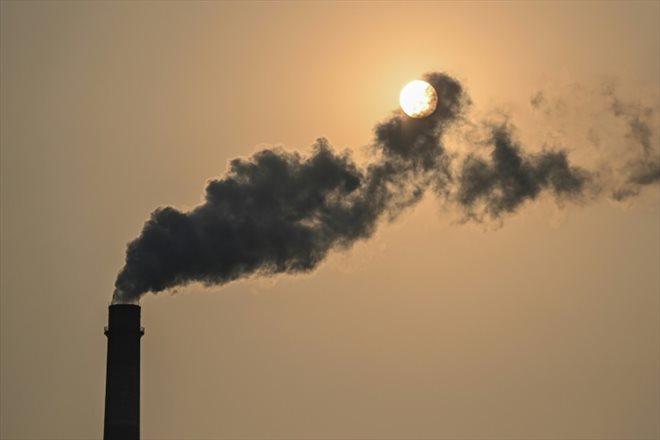A chimney of the Wujing coal-fired power plant in Shanghai on September 28, 2021 (AFP/Archives/Hector RETAMAL)
The energy ministers of the G20 countries, meeting in India on Saturday, failed to agree on a timetable for gradually reducing the use of fossil fuels (oil, gas, coal).
Their final declaration published at the end of the meeting in Goa does not even mention coal, yet one of the big contributors to global warming.
But coal is also one of the main sources of energy for many developing economies, including India, the world’s most populous country, and China, the world’s second largest economy.
This failure to agree comes despite the will displayed in May in Hiroshima by the leaders of the G7 to “accelerate” their “exit” from fossil fuels, and while global temperatures are reaching record levels, causing heat waves, floods and fires.
To explain this impasse, India, which chairs the G20, explained that some of the members wanted a “reduction of fossil fuels + unabated +” that is to say not backed by carbon capture or storage devices, “in accordance with different national circumstances”.
While “others have a different opinion on whether carbon capture and storage technologies meet these needs”.
Alden Meyer, an analyst at the E3G think tank, lamented the failure of the negotiations.
– “Need to rally” –
“With temperature records reached every day around the world and the impact of climate change spiraling out of control, the world needed the G20 energy ministers to rally together,” he said in a statement.
A coalition of eighteen countries, including France and Germany, led by the Marshall Islands, called last Friday “an urgent exit from fossil fuels” and “a peak in greenhouse gases by 2025”, believing that “humanity cannot afford to wait”.
This coalition calls for a 43% reduction in global emissions by 2030 compared to 2019, in order to respect the 1.5°C limit, in accordance with the calculations of United Nations climate experts.
But many developing countries believe that the rich countries, the biggest polluters, must finance the energy transition more.
India in particular has set a goal of net zero emissions for 2070, 20 years later than many other countries.
A report preparing India’s presidency of the G20 calculated the cost of the energy transition at 4 trillion dollars per year and underlined the importance of low-cost financing for technology transfers and developing countries, a recurring request from New Delhi.
Some big oil producers are also reluctant to exit fossil fuels quickly.
Ed King, of the climate communication network GSCC, blamed Russia and Saudi Arabia in particular for the lack of progress in the negotiations on Saturday.
These countries have “blocked efforts for an agreement on a tripling of clean energies aimed at reducing fossil fuels”, he lamented on Twitter.
The CEO of UAE oil company Adnoc, Sultan Al Jaber, who will chair the COP28 negotiations, said he expects fossil fuels to continue to play a role, albeit small, with the controversial help of carbon capture or storage devices.
However, he considered that their reduction was “inevitable” and “essential”, but that realism prohibited doing without them overnight.
© 2023 AFP
Did you like this article ? Share it with your friends with the buttons below.




